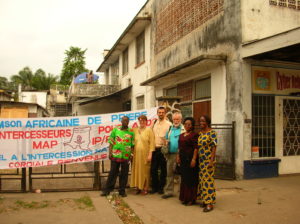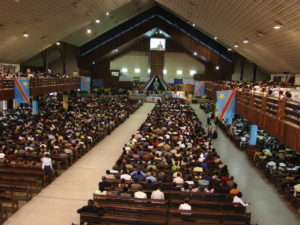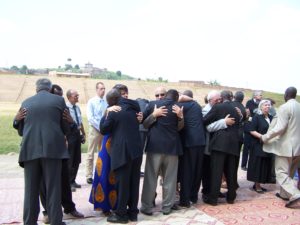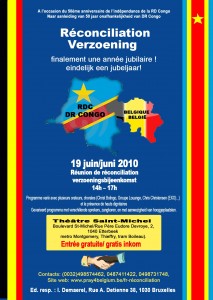As a Belgian prayer movement we have been involved with several reconciliation processes since 2004, both on a national and international level. The most important of these is the “Europe-Africa Reconciliation Process” (EARP, which started in 1999): we are convinced that European countries that had colonies in Africa (and in the rest of the world) were guilty of much injustice and should officially and publically confess their sins and ask for forgiveness. This should be done both for the liberation of those oppressed countries as well as for our own spiritual healing. In a nutshell, Belgium has much to make up for in its relationship with Congo, Rwanda and Burundi. 
To accomplish this we took part with a Belgian delegation in conferences in Berlin (Nov. 2005), Kinshasa (June 2006), and again in Kinshasa and Lubumbashi (June 2008). In July 2009 we went with a new delegation to Rwanda (Kigali & Gitarama). Here you can read some of these reports or documents in English (but if you read Dutch or French, you can read them all on the other pages of this website):
- Report of the Europe-Africa Reconciliation Conference in Berlin (2005)
- Report of the Europe-Africa Reconciliation conference Kinshasa 19-21 June 2008 + Lubumbashi 23 June

- Report of the Reconciliation conference Rwanda-Belgium “Rwanda amateka mashya” (Kigali & Gitarama, 7-14 July 2009)
- Letter of Belgian confession in Rwanda (Gitarama) 2009
Telling the truth about the real circumstances of history is also an important part of the reconciliation process. Often, the general public knows very little about these painful facts. That is why we have put some historical studies together to publish the basic facts of the colonial history, concentrating especially on the Belgian responsibility (only two available in English, all the other ones are on the Dutch and French pages).
- Rwanda-Belgium: short history (the longer version only in Dutch and French)
- “Belgium and the Congo, once upon a time” (2nd article of 3)

After this conference we organised a large reconciliation meeting in Brussels on 19 June 2010 (at the Théâtre St-Michel), at the occasion of 50 years of Congolese independence, with Congolese and Belgian churches. Here you will find the press release (all other documents – the programme, the confession letter and the report of the meeting – are only in French and Dutch). To express this reconciliation not only in words, but  also through a gift of love for Congo from the side of the Belgian churches, we launched a call for donations for the “El Shaddai” project (free schooling for the children of Congo). And we also made a solemn appeal to the Belgian government and the royal family to offer their official and public apologies to the Congolese people for the injustices committed during the colonisation period (1885-1960) and afterwards.
also through a gift of love for Congo from the side of the Belgian churches, we launched a call for donations for the “El Shaddai” project (free schooling for the children of Congo). And we also made a solemn appeal to the Belgian government and the royal family to offer their official and public apologies to the Congolese people for the injustices committed during the colonisation period (1885-1960) and afterwards.
Fortunately, in recent years we have seen in the media that the minds of people and politicians (and the royal family) are increasingly open to an honest confession and a recognition of the painful colonial truth. We, as churches, have prepared the way at the spiritual level and we will continue to pray and mobilise until it is done and completed at the highest level. It will be a big blessing for all the nations involved.
